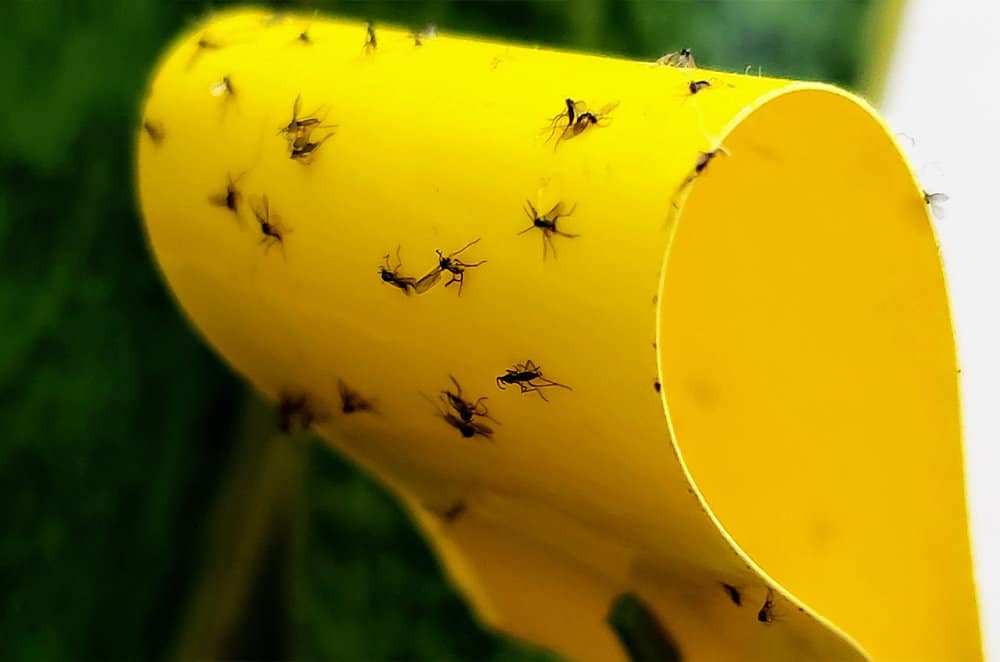
Snake plants are hardy plants that may grow in a variety of environments. On the other hand, snake plant pests can be a pain to deal with. But why is it that pests are drawn to snake plants? How to keep flies from snake plants? Also, what do we do about the pests on our snake plant? Let’s have a look.
Snake Plant Bugs
The snake plant attracts scales, gnats, spider mites, aphids, and whiteflies, among other pests. Pest infestation in the snake plant is caused by overwatering, high humidity, and inadequate air circulation. To keep pests away, avoid overwatering, keep an eye out for them, and use an organic neem-based pest repellent.
You can battle those stubborn pests with the right treatment and get your plant back to healthy and thriving. Learn how to prevent snake plants from being destroyed by pests by reading on.
How To Keep Flies From Snake Plant
We teach you how to get rid of house plant bugs (also known as fungus gnats or sciarid insects) in your home.
It’s not unusual to observe small brown or black flies circling your indoor plants. They’re also scuttling over the compost if you look closely.
Sciarid flies are fungus gnats, sometimes known as fungus gnats. Adult gnats aren’t harmful to plants, although they can be a nuisance in the house. Their small worm-like larvae feed on algae, fungus, and plant roots in the upper 5-8cm of compost. Healthy houseplants can usually endure slight root damage, but the larvae can severely harm seedlings and weak plants.
You Will Need
House plants
Yellow sticky traps
Grit mulch
Biological control for fungus gnats
Sundew plant
Systemic insecticide
Keep Flies From Snake Plant, Step 1
Fungus gnat larvae enjoy damp compost because it contains algae and fungi, which the larvae consume. Allowing the compost to dry between waterings will drastically minimize the gnat population. Not only that, but plant roots exposed to too much water are more likely to die. Therefore reducing the amount of water will benefit the plants as well.
Keep Flies From Snake Plant, Step 2
Fungus gnat larvae are not present in most commercially available composts because they have been sterilized. Flies will not lay eggs if you cover the surface of the compost with a 1cm thick mulch of gravel, grit, or beautiful glass pebbles. Fungus gnats can be found in homemade garden compost, so avoid using it indoors.
Keep Flies From Snake Plant, Step 3
Traditional ways are sometimes still the most effective. Yellow sticky traps are organic and pesticide-free, and they function because fungus gnats find the color appealing. Simply hang a trap near the plants in question, or tie it to a bamboo cane buried in the compost. Gnats rarely fly far from the compost, so keep the trap close to the ground. Whitefly, aphids, and bluebottles will also be caught in the traps.
Keep Flies From Snake Plant, Step 4
If you have a lot of house plants, biological control may be beneficial. Use the nematode Steinernema feltiae, predatory mites, or rove beetle larvae to control fungus gnats, and follow the package instructions. These can be purchased from online vendors. While nematodes and beetle larvae can be used in the home, mites and beetle larvae should only be utilized in a greenhouse or walled conservatory. If you only have a few houseplants, a sundew Drosera is a fantastic choice, as these sticky carnivorous plants are excellent at collecting fungus gnats.
Summer House Plant Care
In the summer, move your indoor plants outside to boost their growth. That way, the flies won’t bother you, and you’ll introduce natural invertebrates to the soil, some of which may prey on the adults and larvae.
Frequently Asked Questions
What is the best way to clean and care for snake plants?
There is no definitive answer to this question as the methods of cleaning and caring for snake plants will vary depending on the type, the size, and the environment in which the plant is located. Some general guidelines for cleaning and caring for snake plants include watering the plant regularly (at least once a week), removing dead leaves and flowers, cleaning the plant’s roots with a watering can or pot scrubber, and fogging the plant with a water droplet every two weeks. The source of information for these facts and figures is various gardening guides.
What are some of the best ways to kill flies around snake plants?
There are many ways to kill houseflies around snake plants. Some popular methods include diatomaceous earth, fly traps, sticky traps, and electronic insecticides.
What type of snake plant is the best for keeping flies and mosquitoes away?
There is no one-size-fits-all answer to this question, as the best snake plant for keeping flies and mosquitoes away will vary depending on the location where it is being planted and the types of flies and mosquitoes prevalent there. However, a good option for keeping flies and mosquitoes away from plants is to choose a snake plant variety with mosquito-repelling flowers, such as the English Ivy or the Spider Plant.
Which household products work best to repel flying insects?
Citrus oils work the best to repel flying insects. The National Pest Management Association recommends using products with a high repellency such as DEET, picaridin, or IR3535.
What should I do if my snake plant is covered in flies?
Place the snake plant outside in the sunshine for a few hours to eliminate the flies. Alternatively, you can use insecticidal soap or a neem oil spray to rid the plant of the flies.
Is there anything else I can do to prevent or control flies around my snake plant?
Not much can be done to prevent flies from around a snake plant. Some organic insecticide products can be used as a preventative measure, but the best solution may be to keep the area clean simply.

